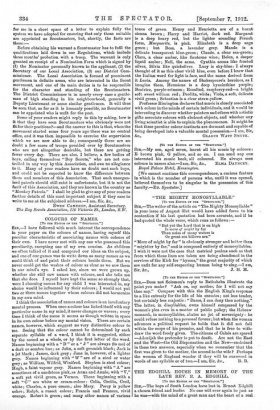[To THE EDITOR OF THE "SPECTATOR."] SIR, — Does not Solomon's reply
to Bathsheba illustrate the point you make ? "Ask on, my mother, for I will not say thee nay." Compare with this the English King's response to a like entreaty for the life of his enemies ; not less tender, but certainly less majestic : "Dame, I can deny thee nothing." The latter, in dissyllables, owns himself conquered by the woman's plea even in a matter of public policy; the Hebrew monarch, in monosyllables, abates no jot of sovereignty : he could refuse nothing to a personal favour ; but when the woman advances a political request he holds that it did not fall within the scope of his promise, and that he is free to with- draw the word freely given. The citizens of Calais are spared —Adonijah the pretender is put to death. Are not the East and the West—the Old Dispensation and the New—enshrined in these two answers, especially when we remember that the first was given to the mother, the second to the wife ? Perhaps the women of England wonder if they will be answered in
words of one syllable or of two.—I am, Sir, &e., R. B.






































 Previous page
Previous page